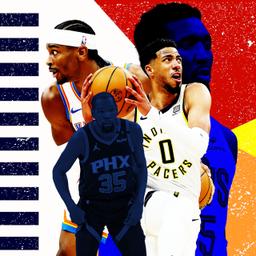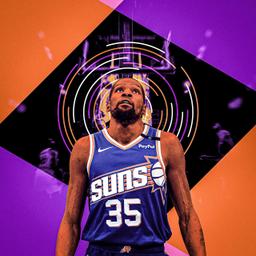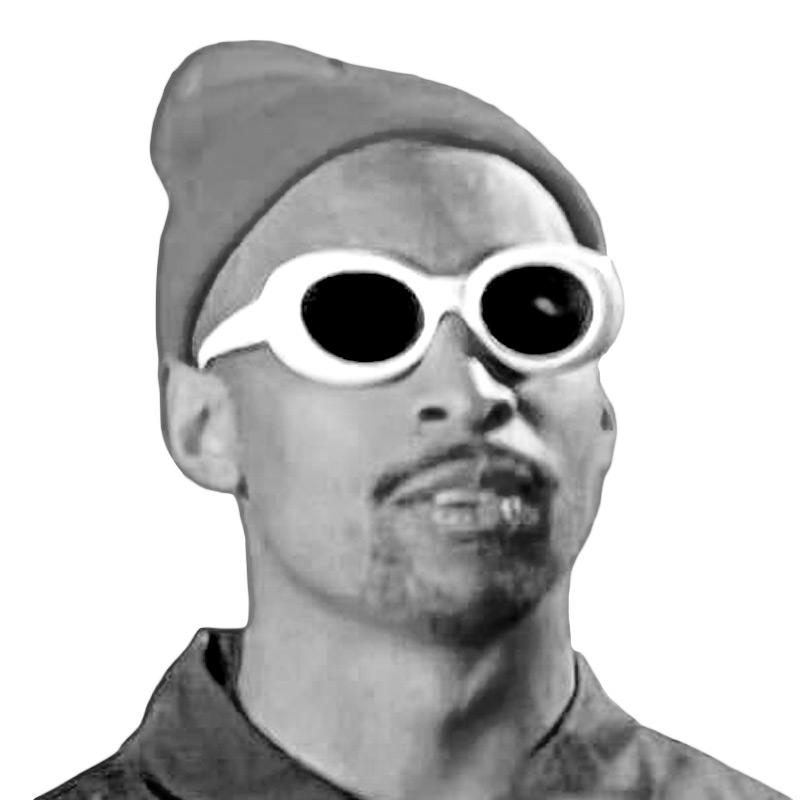There are few things on a basketball court more cinematic than Kevin Durant with the ball in his hands and the game on the line.
Tonight, an unseasonably warm March evening in the desert, the person tasked with stopping him is Bucks forward Kyle Kuzma. There are 30 seconds left and Durant’s Suns are down 105-103 when KD receives a pass from Tyus Jones at the top of the key. He sizes up Kuzma as 17,000 fans look on, desperate for a reason to celebrate amid a dismal season.
In PHX Arena, it feels like a lot is riding on this moment. The Suns have the most expensive roster in NBA history, with precious little to show for it. The massive trades that brought Durant and Bradley Beal to Phoenix have plunged the team into salary cap hell and emptied its draft cupboard. Last season, the Suns finished sixth in the West before being swept by the Timberwolves in Round 1 of the playoffs. This season has been even more disappointing. Under new coach Mike Budenholzer, the Suns have spent most of the year under .500, battling for the Western Conference's final play-in spot. Injuries and role changes have derailed Beal’s impact. Budenholzer’s relationship with Durant has been tenuous at times, contributing to the miserable vibes in the locker room. Things have been so bad in Phoenix that Ishbia tried to trade Durant at the deadline, three months after claiming he would be on the team for the long haul.
All of which contributes to the tension building as Durant begins his move. He takes one dribble, gets Kuzma off balance with a slight left-shoulder bump, and retreats beyond the arc for a silky stepback 3-pointer to put the Suns up one. The crowd is euphoric. Two possessions later, Devin Booker follows up with a jumper to seal the Suns' fourth straight victory, their longest win streak since early November.
“This is what the city’s been waiting on,” Booker tells me after the game. “It’s been tough, it’s been a grind. We’re in a tough situation right now, but I think this is what we’ve been waiting on the whole time.”
For many Suns fans, the wait has seemed like forever. Phoenix has fielded many memorable teams in its 57-year NBA history, but none have won a title. When Mat Ishbia agreed to buy the franchise in December 2022, it seemed like that might change. In his first big move as owner, the Suns traded Mikal Bridges, Cam Johnson, Jae Crowder, four first-round picks, and one first-round swap for Durant. The following summer, they doubled down by trading Chris Paul, Landry Shamet, and a host of picks and swaps for Beal, transforming what had been a plucky young upstart into one of the most talented—though top-heavy—rosters in the NBA.
It hasn't worked out like anyone in Phoenix anticipated. Even the faint hope of the Suns’ recent win streak was soon snuffed out. Two nights after the Bucks game, they were dismantled by the Jayson Tatum–less Celtics. Then, they lost to the Wolves and were blown out by the 2-seed Rockets in a game that Durant left early with an ankle injury.
With seven games remaining in the regular season, the Suns sit in 11th place in the West, one game behind Sacramento for the final play-in spot. They have the NBA’s toughest remaining schedule, starting Tuesday night with a critical rematch against the Bucks. If the Suns do qualify for the play-in, they’ll have to win a pair of games just to advance to a first-round series with the top-seeded Thunder.
“We put ourselves in this situation,” Booker told reporters last week, “so it feels like the playoffs already. We’ve got to have every game.”
Barring a miraculous run, this will go down as one of the most disappointing seasons in league history. Durant remains one of the NBA’s most majestic players and Booker is one of its premier scorers, but the promise of their partnership has never fully materialized. All that’s left to do is play out the season, inching closer to a summer of questions that will shape the legacies of those two stars, challenge Ishbia’s vision for the team, and test the patience of a passionate fan base that is starving for a title.
“We know we have the talent in the locker room to do it,” Booker says. “It's going to be tough, but we're here for it.”
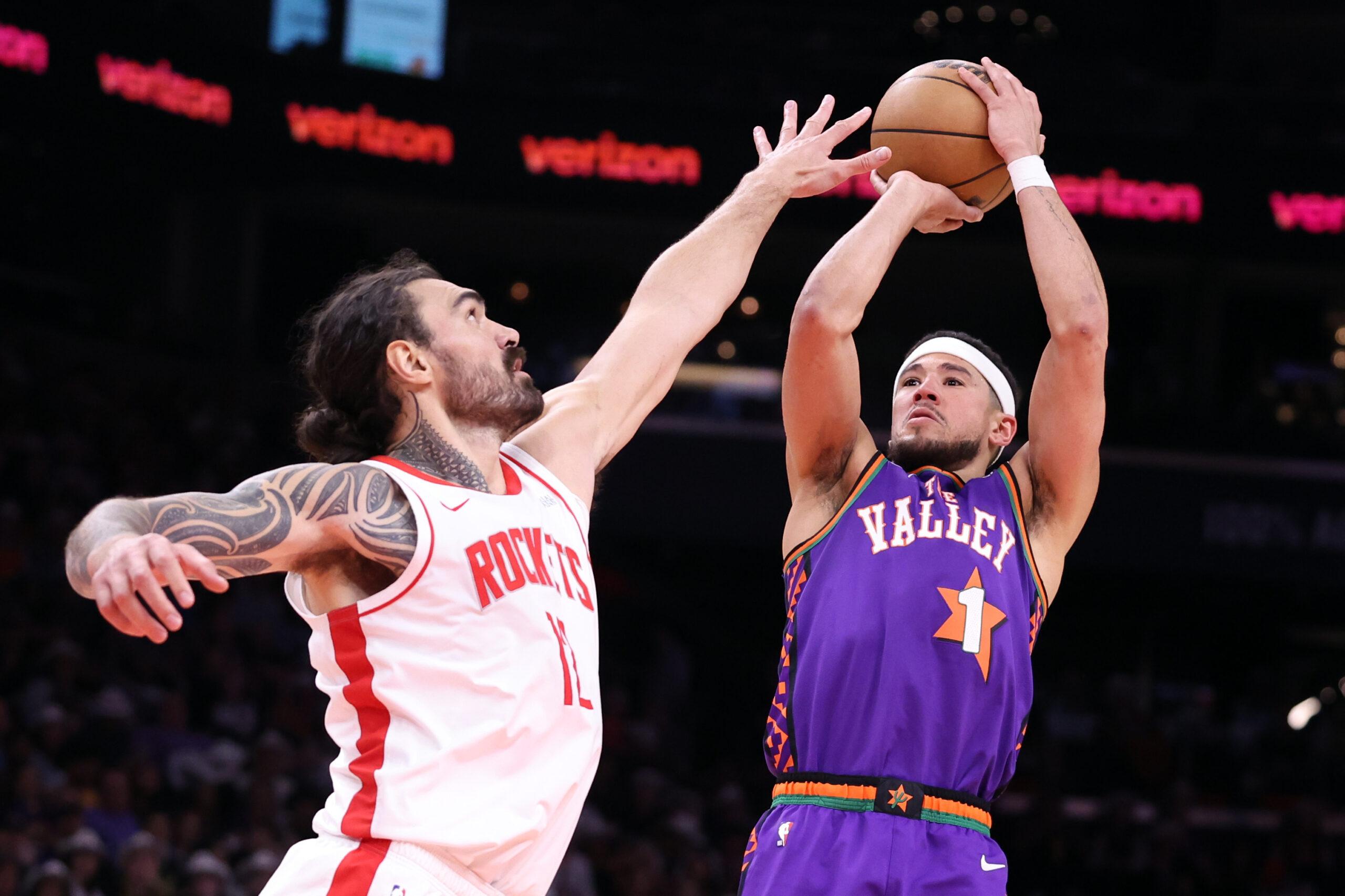
A day after the Suns’ emotional win over the Bucks, I’m in the control room of a radio studio, tucked inside a nondescript commercial strip in North Phoenix, watching John Gambadoro and Dave Burns take calls from Suns fans around the region.
Armando from Laveen Village calls to say he got so excited during the Suns' latest win that his yelling almost woke up the kids, much to his lady’s chagrin. Pedro in Mesa phones in looking to make sense of his mixed emotions. “I don’t know if optimistic is the right word,” he says of the team’s recent play, “but at least it's fun to see the Suns again.“ Then he proceeds to argue that trading both Durant and Beal would solve the team’s problems.
For other fans, like Antonio from Phoenix, the team’s mini-turnaround was too little, too late. “Even when they were terrible, I don’t remember them putting me into this type of turmoil,” Antonio says. To illustrate how loopy today has been, the show runs a poll asking the listeners to choose which Arizona athlete has been more frustrating: Jordan Montgomery, a high-priced pitcher for the Diamondbacks who will miss the entire 2025 season after Tommy John surgery, or Beal? Beal garners 83 percent of the vote.
If anyone has their finger on the pulse of Phoenix sports fans, it's Gambadoro and Burns. The duo has cohosted Burns & Gambo, an afternoon slot at Arizona Sports 98.7, for the last 13 years. Burns was born and raised in Phoenix and has been a Suns fan his whole life. Gambo is a New York native who still recalls the moment he arrived in Phoenix in 1996.
“I'm getting through Flagstaff and the first thing I saw was this billboard,” Gambo says. “It said, ‘We just added a little rocket fuel.’ It was when [the Suns] traded Charles Barkley for like four guys on the Rockets.”
The Suns occupy a very special place in the desert. As Phoenix’s first major professional franchise, they hold the rare distinction of being the no. 1 team in a town that also boasts MLB, WNBA, and NFL teams. "They were the first love," Gambadoro says. "The Suns were before everybody else. So a lot of people grew up with their parents talking about the Suns and going to the games at the Madhouse on McDowell.”
But for the majority of their existence, the Suns have lived in a purgatory between good and great. In 1976, Hall of Famer Paul Westphal led the Suns all the way to the NBA Finals, where they lost to the Celtics. Seventeen years later, after trading for perennial All-Star Charles Barkley, the Suns made their second Finals appearance, losing to Michael Jordan’s Bulls in six games. (The loss didn't stop them from holding a parade back in Phoenix, as a way to salute the team after a historic season. Three hundred thousand fans showed up on a 114-degree day to show their love for the NBA runner-ups.) In the 2000s, the “Seven Seconds or Less” teams, led by coach Mike D’Antoni and point guard Steve Nash, helped revolutionize NBA offense, but topped out in the conference finals. And in 2021, a team led by Booker and Chris Paul made an improbable run to the Finals before losing to the Bucks in six games.
“The Phoenix Suns always seem to be good,” Burns says, “but never quite good enough.”
Some of the Suns’ more recent failures can be traced to former team owner Robert Sarver, who owned the Suns from 2004 until 2022. Under Sarver, the team floundered throughout the 2010s with a string of losing seasons, while Sarver fostered a toxic work environment with a disturbing pattern of racist and misogynistic behavior. All the while, many people around the NBA viewed the Suns as sleeping giants, citing Phoenix’s huge local market, passionate fans, and rich basketball history—all just waiting to be awakened with the right person in charge.
That is why excitement was high when Ishbia, a former walk-on at Michigan State and the CEO of a prominent mortgage-lending company, purchased the team from Sarver. “I want to think big,” Ishbia said at the time. “I want to think how to make this one of the elite franchises in the NBA and the WNBA.” Ishbia immediately traded the entire farm for Durant, pairing the then-34-year-old with Booker and Paul and establishing the Suns as big-game hunters. That team made the second round of the playoffs but lost to Denver in six games, so the following offseason, Ishbia took another big swing and traded Paul and the Suns’ remaining draft picks for Beal, second apron be damned.
“A lot of Suns fans were so desperate for it to work,” Burns says. “I think the belief was, how the hell are you going to stop Devin Booker, Kevin Durant, and Bradley Beal? You can’t."
But Ishbia's Suns-blazing approach has been thwarted by the changing NBA landscape. His spending has put the Suns deep into the luxury tax and incurred all sorts of roster-building penalties. The trades for Durant and Beal cost the team its most talented young players and almost every single future first-round draft pick—to the point that the Suns resorted to trading their 2031 first-rounder for three worse first-rounders to try to give themselves more options. Ishbia seems to subscribe to the belief that the only way out is through, and that means this year's Suns have been through a lot.
Budenholzer has been forced to rely on young players like two-way guard Collin Gillespie, center Nick Richards, and 6-foot-8 rookie Ryan Dunn, who was tasked with guarding bigs Brook Lopez and Giannis Antetokounmpo in Phoenix’s win over Milwaukee. Meanwhile, Beal’s season from hell has been exacerbated by frequent criticisms that his no-trade clause is limiting Phoenix’s ability to make any moves. Simmering frustrations came into the foreground last month during a game against the Lakers, when Durant traded barbs with Budenholzer during a first-quarter timeout. Sources say Durant was pleading with his coach to simplify the team’s offensive concepts to something better suited to the Suns’ younger players.
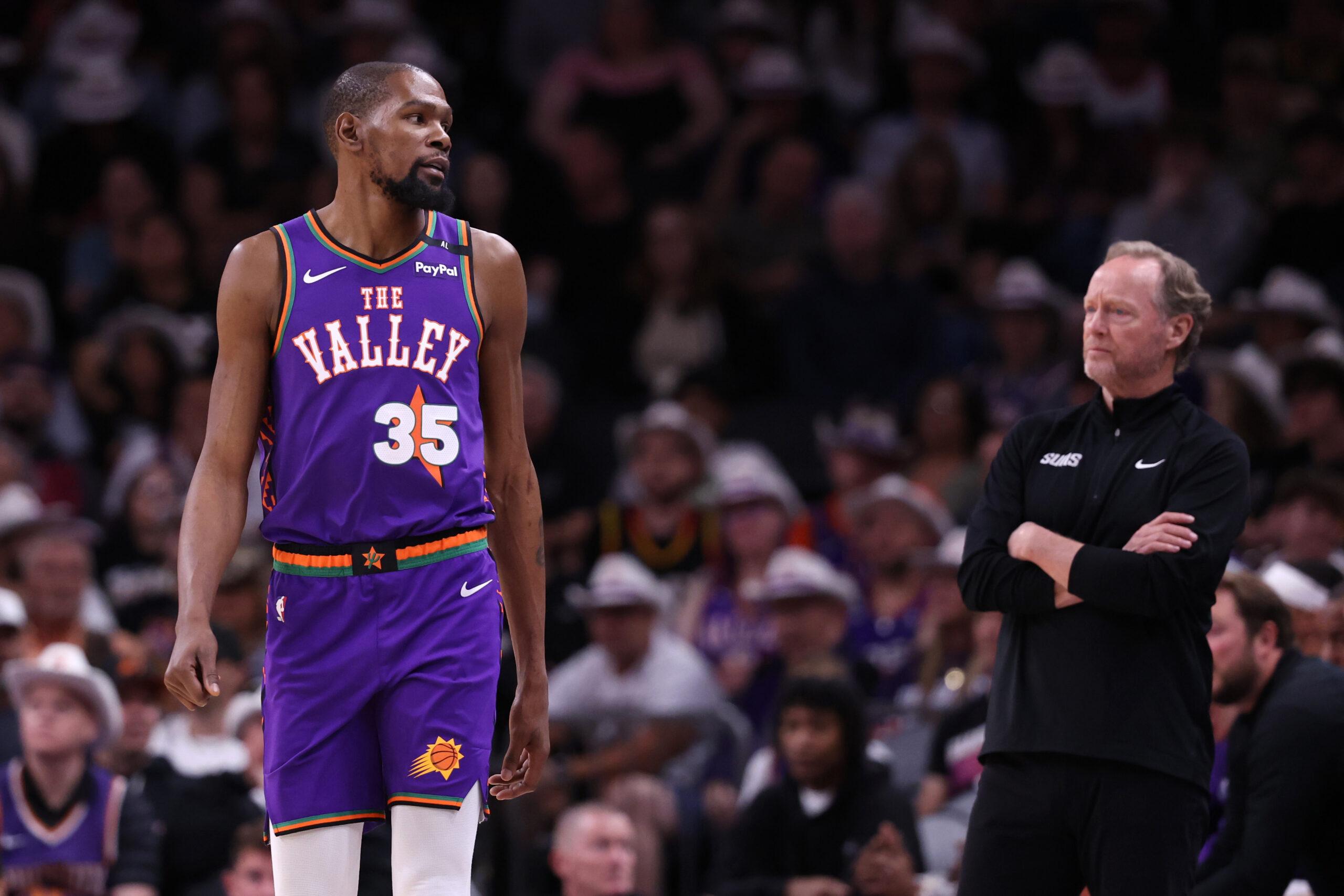
Some fans are angry at Ishbia for how quickly a contender has devolved into one of the worst situations in the league. But others see Ishbia as someone who, despite his mistakes, wants to take the Suns to heights they’ve never reached, and is willing to spend the money and take the risks that are required.
“I think eventually Mat Ishbia is going to bring a championship to Phoenix, because he's determined to do it,” Gambadoro says. “And he's passionate about it and he's committed to it.”
It’s a sentiment echoed in many places throughout the organization. “Knowing his character, he wants to win,” Booker says when I ask why he trusts Ishbia to steer the organization. “He's been around winning, he's been in the locker rooms of winning, so he knows what it takes.”
Booker glides through the corridors of PHX Arena like a man who can do no wrong. Following the win over Milwaukee, the path to his triple-white ‘93 GMC Typhoon is lined with dreary-eyed fans, and Booker stops frequently to produce memories that will last a lifetime.
“Can we take a picture?” a young child asks, as Booker pauses to oblige. “Can you sign this for Tory?” a father asks as he holds out a Sharpie and a child-size version of Booker’s newest Nike shoe.
Booker was drafted by the Suns in 2015, and he's since become a fixture of Arizona sports, spoken in the same breath as Barkley, Diana Taurasi, and Larry Fitzgerald. The Suns averaged just 22 wins over his first four seasons, but Booker made himself into an All-Star and put the Suns back into contention. In the process, he forged a connection with Phoenix sports fans that goes beyond basketball.
Despite the struggles of this campaign, Booker still wants to play his entire career in Phoenix. He's seen his peers leave their teams in search of championships, often with frustrating results. “It's not always greener on the other side,” Booker tells me. “People always want to leave their situation and end up in a worse situation and then they go missing. You'll never have the love like you have by the team that drafted you.”
He strives to be the rare one-franchise star, and in particular, he wants to be the player who delivers a long-awaited title to Suns fans. “It's great people,” Booker says, “and there's an untapped fan base that it's never been done here before and that's what everybody's been waiting on.”
As the Suns try to extricate themselves from their current mess, Booker’s future has become the most important question. He is no longer the early 20-something with a long career in front of him. At 28 years old, Booker has fewer years to chase a title and would like his team to accommodate those ambitions.
“I'll never be in a rebuild again,” Booker tells me. “We're always going to be competing and trying to get to a championship.”
At least Booker and Ishbia can agree on that. Both have made it clear that their partnership will continue, but what's less certain is how, exactly, the Suns will build another contender around their longest-tenured star. The team is hamstrung by the second apron and lacks the assets to bring in more high-end talent. Beal’s exorbitant salary makes him one of the worst contracts in the entire league. And while most people around the NBA expect the Suns to trade Durant in the offseason, the sharpshooter is now 36 and set to become a free agent after next season; he is unlikely to fetch a haul like the one Phoenix gave up for him.
“It's upsetting,” Booker tells me. “Ultimately when you're playing with this type of talent, you expect a championship. And our first year linking up together was our best run at it, winning two games [against] Denver. And ever since then, it's kind of been downhill.”
If there’s anything left to learn about this team, the next month should reveal it. The book isn’t closed on Durant returning to the Suns next season. League sources suggest that Durant, who will be eligible for a two-year, $122 million extension this offseason, would be open to a return. Booker says he’d be excited to continue playing with his idol. “Hell yeah, I want to play alongside him,” Booker says. “The team's been in a tough situation. So, that's the NBA today. I think K understands the business too, that when things aren't going the right way, people are going to explore options. I don't know how serious it actually was, but we moved past it. You see his morale, you see how he feels about the city.”
After the Burns & Gambo show, as I’m getting ready to leave the station, I ask the hosts how they view the impending offseason and the litany of questions facing the Suns. “Complicated,” Burns explains, unsure how much stock to put into the team’s recent play. “By next Tuesday, everything could have changed,” he says.
Sure enough, his words proved prophetic. In the third quarter of the Suns’ Sunday night game against the Rockets, Durant rolled his ankle on Jabari Smith Jr.’s foot. An MRI later revealed an ankle sprain, and Durant is expected to miss at least a week as the Suns fight to climb back into the play-in.
It’s a fitting encapsulation of a team that hasn’t been able to get out of its own way. Suns fans have been treated to moments of individual brilliance from Booker and Durant, but the duo, and the group tasked with building a team around them, will be remembered most for what could’ve been.
"It's just a shock,” Burns says, reflecting on the last three seasons of Suns basketball. “How does a team with two Hall of Fame guys, two Olympians, two guys in their prime, how do they not go further?"

